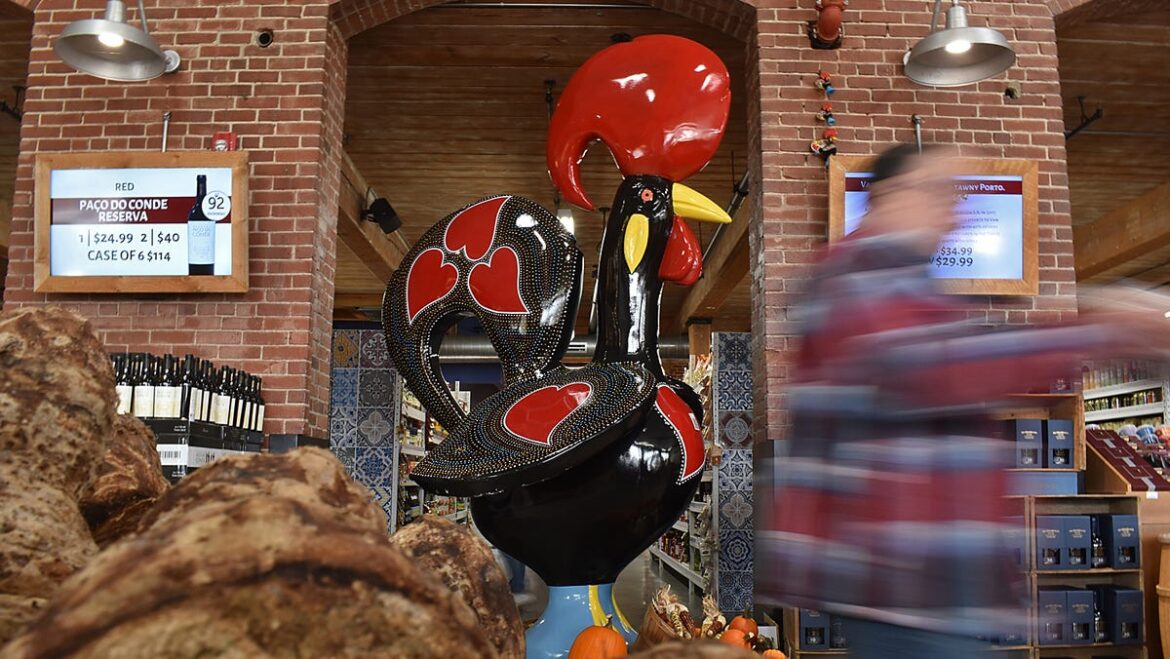FALL RIVER – A trip to the local store to buy your favorite Portuguese foods, beverages and other items may soon cost you more as President Donald Trump’s new policy to add across-the-board tariffs on imports from the European Union could have significant implications for your wallet.
Last week, Trump announced the 27 member states of the European Union, including Portugal, will face 25 percent import tariffs on steel and aluminum and cars and broader tariffs of 20 percent starting Wednesday, April 9.
Michael Benevides, vice-president of Business Development at Portugalia Imports and Portugalia Marketplace, which brings the community’s favorite Portuguese products all under one roof, said imported items from Portugal will likely be more expensive in the short term.
“In the past, when we’ve faced price increases, we have absorbed some of the impact,” he told O Jornal. “However, we cannot bear the full burden and would ultimately need to pass a portion on to the end consumer. We will have to wait and see how things unfold.”
Benevides said the tariff increase could have a significant impact on his family business.
“Unlike conventional grocery stores that primarily stock domestic products, our establishment specializes in imported goods, particularly from the EU,” he said. “We have already experienced significantly high inflation and a sharp rise in international freight costs over the years. The cost of imports has gone up significantly over time.”
Brands of Portugal, an importer and distributor of wines and spirits from Portugal, used its Facebook page to explain how the proposed tariffs could affect the price of an imported bottle of wine.
“As a small business, we’re committed to fair pricing. These changes make it tough,” they wrote. “Essentially, tariffs add costs at each step of the supply chain. As a small importer, we absorb some of this, but ultimately, increased costs are often passed along. For example, a 25% tariff increase might add roughly $1 to the wholesale cost of a bottle. By the time it reaches your table, that could translate to a $3 increase.”
For Benevides, while the new tariffs may potentially have a significant impact on Portuguese exports to the United States, Portugal may fare better than some of its E.U. counterparts.
“Portuguese goods, comparatively speaking, offer better value than their European counterparts,” he said. “Hopefully, consumers will recognize this and respond positively.”
Which Portuguese industries will likely be affected by the new tariffs?
Outside of Europe, the United States is Portugal’s largest trading partner.
Many fear that as American consumers start seeing higher prices for Portuguese goods, the demand will likely decrease.
As stated on the U.S. Department of State website, in 2023, according to the U.S. Department of Commerce, U.S. imports from Portugal were $9.2 billion, up 12.8 percent from 2022 and U.S. exports of goods and services to Portugal were $4 billion, down 8.9 percent from 2022. As a result, the trade deficit with Portugal increased to $5.2 billion.
According to Portugal’s National Institute of Statistics, the top exports from Portugal to the United States in 2024 were:
ChemicalsMineral fuelsMachinery and equipmentPlastics and rubberCommon metalsTextile materialsWood and corkClothingFoodMinerals
As a result, these are the key Portuguese industries which are considered particularly vulnerable to the imposed U.S. tariff increase.
Portuguese wine industry could be significantly affected
The United States is the first non-European market for Portuguese wine exports. As a result, the new U.S. tariffs are expected to significantly impact the Portuguese wine industry.
According to ViniPortugal, the interprofessional association of the Portuguese wine industry, the United States strengthened its position as the second largest market for Portuguese wines in 2024, with exports to the United States reaching more than $113 million.
In 2024, Portugal exported approximately 36 million euros of Port wine to the United States, which represents a 6.5 percent increase from the previous year.
Luís Machado, president of the Douro Intermunicipal Community (CIM), warned Monday the new U.S. tariffs will have an “immediate impact” on the Portuguese wine industry, which has spent years establishing itself in the U.S. market.
US tariffs expected to hit Portuguese companies hard
Luís Miguel Ribeiro, the chairman of the Board of Directors for the Portuguese Business Association (AEP), said he expects companies in Portugal to be “very affected,” either directly or indirectly, by the new tariffs imposed by the United States.
“On the one hand, directly, because exports of goods will become more expensive to the American market, our fourth main client and the first non-European, with a weight of around seven percent in the overall value of Portuguese exports of goods,” Ribeiro told Portugal’s Lusa news agency.
“On the other hand, the effects will also be felt indirectly, above all through the impact that the European Union, where we direct more than 70 percent of our exports, will suffer and which will have repercussions on the dynamics of external demand directed towards the Portuguese economy,” he added.
AEP anticipates that the sectors that will have the greatest difficulty in coping with the additional taxes will be those that have a commercial relationship with the U.S., namely those that are heavily exposed to this market, such as “various sectors with a high degree of productive specialization in the Portuguese economy, such as foodstuffs, textiles and footwear,” as well as “products from the chemical, metalworking and equipment industries.”
“But there will be much more, because we can’t forget the indirect impacts,” he stressed.
Ribeiro recalled the Bank of Portugal’s estimate that a tariff shock could have a negative impact of 0.9 percentage points on Portugal’s Gross Domestic Product (GDP) growth this year, which he says is “a very worrying sign, given that the magnitude of this impact corresponds to around 40 percent of the growth projected for the Portuguese economy for 2025.”

